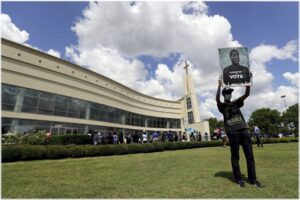Courtesy of the Bastrop Advertiser
June 10, 2020
By Joni Ashbrook

Terrence Floyd showed such grace when he visited the Minneapolis site where his brother George Floyd was murdered.
Even though he watched the video of his brother crying “I can’t breathe” as a police officer pushed his knee into George’s neck, Terrance still pleaded for people to use their vote not violence to end police brutality.
As I listened to his powerful message, my heart sank knowing Republicans have suppressed black and other minority voters for a very long time.
In 2013, conservative justices on the U.S. Supreme Court made it easier for the GOP to disenfranchise minority voters by defanging the Voting Rights Act of 1965.
The ruling in Shelby County v. Holder released nine states, including Texas, with long histories of racial discrimination from having to “preclear” changes to their election rules with the federal government before implementing them.
Just hours after the ruling that ended that pesky oversight, then-Texas Attorney General Greg Abbott said he would “immediately” enact two measures that a federal court had previously rejected as discriminatory: the GOP’s stringent voter ID law and its redistricting maps that protected white incumbents while altering districts with minority incumbents.
Also, Texas voters recently waited hours in line to vote because the GOP closed 750 polling places since the Voting Rights Act was gutted.
According to an analysis of Texas by the Guardian, “The 50 counties that gained the most Black and Latinx residents between 2012 and 2018 closed 542 polling sites.”
That’s compared to only 34 poll closures in the 50 counties with mostly white Republican majorities.
The nonchalant look on the officer’s face as he snuffed out George Floyd’s life reminded me of the impunity the GOP flaunts as it disenfranchises minority voters.
In 2018, Georgia’s then-Secretary of State, Republican Brian Kemp, was a “suppression star” for running an election brimming with strategies to block African Americans from voting for Stacy Abrams, a formidable black candidate for governor.
Kemp not only imposed the run-of-the-mill suppression tactics like closing polling locations creating long lines, he also masterfully held up tens of thousands of mostly African-American voter registration applications using a creative “exact match” law.
That GOP law allowed voter registrations to be sidelined if there was so much as a missing hyphen between the application and their ID.
The cherry on top of that suppression sundae was an unbelievable conflict of interest. Kemp was administrating this undemocratic election at the same time he was the GOP candidate for governor. Yet for all their oppressive efforts, Kemp just narrowly won.
If people are allowed to vote, there are leaders who’ll enact policies to address the systemic racism that oozes through our society.
Following the civil unrest from the killing of another unarmed black man, the Obama administration’s Department of Justice began rooting out unconstitutional policing practices within troubled departments around the country.




